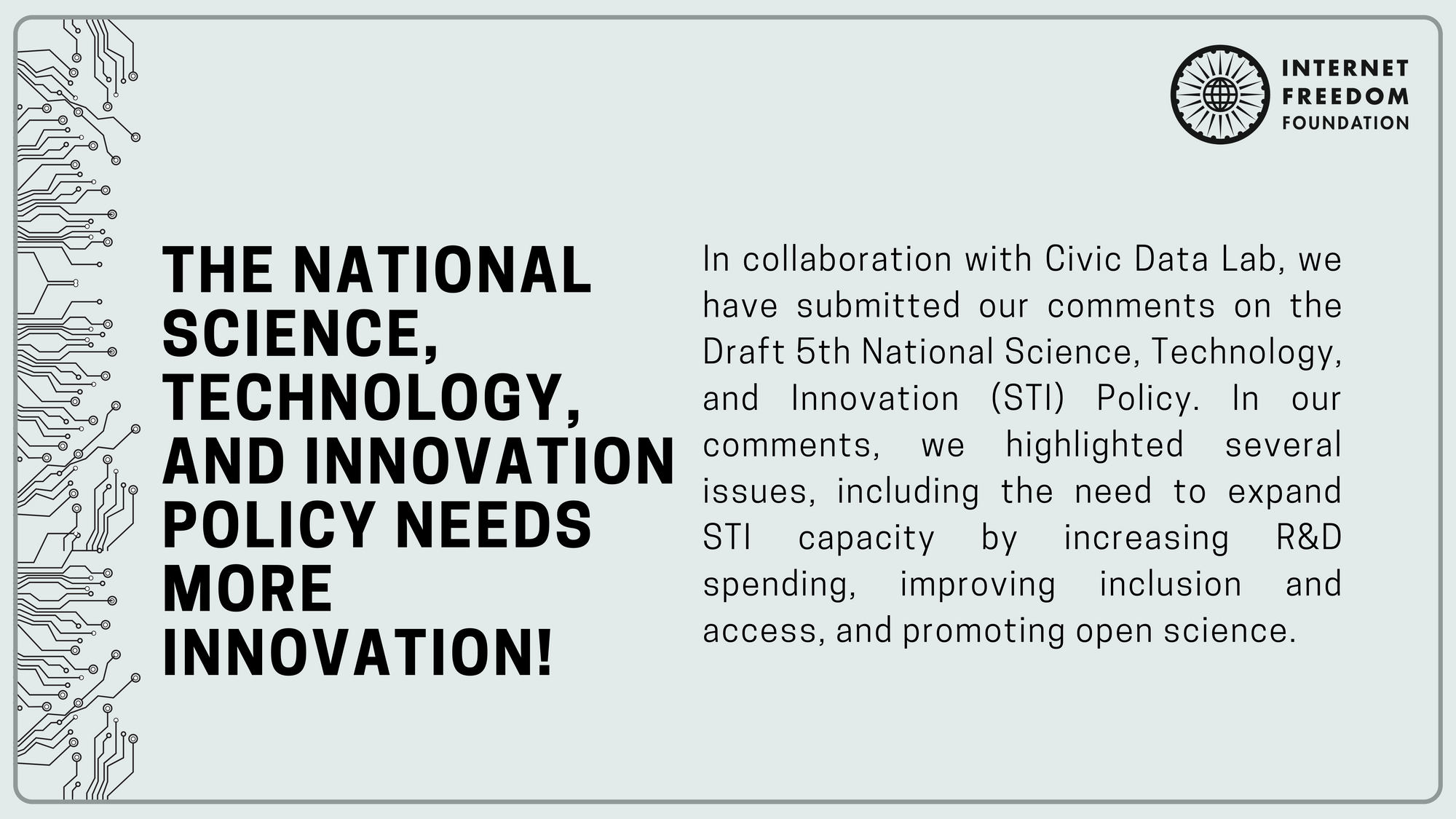
Tl;dr
In collaboration with Civic Data Lab, we have submitted our comments on the Draft 5th National Science, Technology, and Innovation (STI) Policy. In our comments, we highlighted several issues, including the need to expand STI capacity by increasing R&D spending, improving inclusion and access, and promoting open science.
The existing state of play
As the world proceeds further into the 21st century, it is clear that the future is digital, and that emerging technologies that hitherto could barely be countenanced will change human lives in a significant way. The National Science Foundation of the US has said that 80% of the jobs that will be created in the next decade will require some amount of mathematical and scientific skills. In such a context, It is imperative that India prepares itself for such a future by possessing a thriving scientific community and a booming technology base. The challenge is to create systems that harness a large number of graduates in the sciences and engineering to improve India’s science and technology ecosystem.
As per S&T indicators collected and compiled by NSTMIS, DST, GoI in 2019, India’s GERD has been stagnant to just 0.7% of the GDP for the last 5 years. When compared to 31 most developing & developed countries, India ranks at a concerning 26th position standing last among the BRICS nations.
Further, the S&T indicators highlight the need to set clear fiscal targets to increase India’s per capita expenditure on research & development from 47.2 (current PPP$) to 300 (current PPP$) coming slightly above the current world’s average in next 5 years.
Meanwhile, in spite of recent strides, private sector investment in R&D remains low: in 2004-05, the private sector accounted for 28% of research spend; it was 40% in 2016-17. Indian corporate hesitancy about spending on R&D is well documented, with most private sector entities having “a limited risk-appetite to invest in futuristic technology.”
Lastly, while things have been improving, many concerns with respect to exclusion in STEM fields still remain. For example, in 2017, the share of male students enrolled in engineering and technology is 71.1% compared to female enrolment, which is just 28.9%. Meanwhile, as of 2019, central government data indicates that across 23 IITs only 2.8% of the faculty come from SC, ST, or OBC backgrounds.
Our submissions
We believe that the draft policy contains many excellent proposals. We appreciate the key themes and guiding principles being laid down, and at the same believe a certain amount of granularity in terms of implementation must be added to ensure that the frameworks laid down here actually come to fruition. While such lofty goals are eminently laudable, without a way to measure these progress towards these goals there is a danger of such outcomes simply remaining words on paper. Furthermore, there remain certain outstanding issues particularly focussed on rights based frameworks which must be addressed.
- Transparency and Accountability: The draft policy contains very laudable goals and proposals. However, certain portions lack granularity in terms of the implementation, and so would be helped by an increased amount of specificity. This would help to improve transparency and public accountability.
- Improving inclusion and access: Indian academia has faced many questions over the levels of inclusivity and diversity within it. While the policy does acknowledge these issues and indeed does try to address them, certain focus areas require a greater amount of attention. This would demand expanding the scope of existing policies, creating frameworks for representation, and conducting assessments based on data to create inclusivity and diversity indexes for institutions.
- Increasing STI Capacity: India’s Gross Domestic Expenditure on R&D lags significantly behind global peers at 0.7% of GDP over the last five years. To boost capacity and STI funding, expenditure on R&D should be ramped up to 1.7% of GDP.
- Facilitating Innovation: Despite possessing a large number of engineering graduates, India does not produce enough innovation, as evidenced by low amounts of private sector investment in R&D. To boost innovation and take advantage of emerging technologies, private sector investment into R&D must be facilitated. However, public funding for R&D should not lag behind.
- Promotion of Open Science and IP Law: The draft policy's focus on Open Access is highly commendable and sorely needed, especially given contemporary happenings with respect to academic journal copyright. To supplement the vision of Open Access laid down, the scope of the provisions should be expanded to include all research, and a legislative framework for universal access to scientific knowledge must be created.
- Increasing focus on quality of scientific output: Despite ranking 3rd globally for scientific publications, India does not produce enough high quality scientific research. To address this, ‘research audits’ must be undertaken for every field to understand shortcomings and devise effective solutions.
- Open Science and FOSS: To complement the more academic focus of the Open Access framework, the Open Science framework should adopt Free and Open Source Software. This will foster grassroots innovation and allow different entities and stakeholders to collaborate and take advantage of the latest technologies and scientific developments.
- STI Policy and Sustainable Development Goals: International bodies have called for nations to develop an STI roadmaps for the fulfilment of each Sustainable Development Goal. In light of this, the draft policy must prescribe a robust and evidence-based monitoring mechanism to track implementation with respect to the Sustainable Development Goals.
